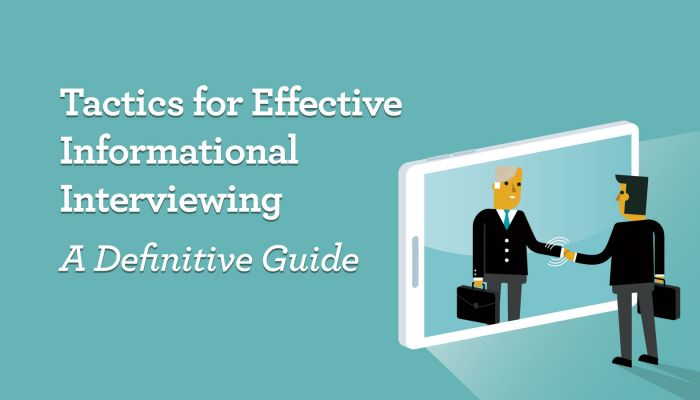Informational interviewing is a great strategy for people at various points in their careers, whether they’re fresh out of school or seasoned professionals looking to make a job or career change.
For the newbie, it’s a way to network with people at specific organizations you may be interested in. For experienced professionals, it’s a savvy strategy if you want to explore a new career path or are considering a professional transition.
Let’s look a little deeper at informational interviews, specifically what they are, how they may fit into your job search strategy, why people on the other side of the desk agree to do informational interviews, and tips on getting the most out of them.
What is an informational interview and why should you do them?
Some people are confused about what, exactly, an informational interview is. After all, isn’t every interview informational? That’s the whole point, right? Getting information about a job, a company, its corporate culture, and a whole host of other things you need to know. Yes, that’s true. The key difference between an informational interview and a job interview is, there isn’t necessarily a job opening when you sit down across the desk, or on Zoom, with someone. But — and this is a crucial “but” — that doesn’t mean there isn’t an opening, won’t be in the near future, or that this won’t lead to a job down the road.
Think of an informational interview as a fabulous networking opportunity that can benefit you in many different ways. (To learn more about the crucial process of networking, read “Keys to Effective Networking & Direct Contact: Definitive Guide.”)
A peek inside a company. Just like a conventional job interview, informational interviews may be done in the office of the person you’re interviewing. Once you’re there, you’ll get an inside look at what it’s like to work at that company. You can pick up clues about the company culture by the way people are dressed, how they interact with each other, what the office looks like and the vibe that greets you when you walk in the door. Of course, it can done virtually as well, where the clues to the company culture may be a little more subtle.
Insight into the industry. If you’re contemplating a career change, not just looking for opportunities for advancement along your current career path, but doing a full career 180 and going from being, say, in customer service or sales to a role like project management or something completely different, an informational interview is the perfect way for you to see what that career is really like. Most things look good from the outside. Insider information gives you the real story.
A foot in the door. Done correctly, an informational interview gives you exposure and visibility in a company you’re interested in working for, whether they have a job opening or not. By targeting the right person, your 20-minute talk about the industry, career paths within the company, or certain jobs themselves will position you as a driven, interested, career-minded individual. In other words, if you’ve done your homework before going in, it gives you a chance to make a great first impression. Letting the person know you’d be interested in hearing about future job openings effectively gives you a foot in the door when that time comes. You’ll be ahead of the game before it even begins.
While they can be extremely effective, there are many mistakes people make along the way when scheduling and conducting informational interviews. These pitfalls can lead to making a poor impression that can tarnish your professional brand. Here’s how to get the most out of your informational interviews.
Getting the interview
This can be the most difficult part of the process. After all, you’re asking people to give you 20 minutes of their busy workday and to impart hard-won knowledge about their careers and companies. Why would they agree to do it? It’s all in how you ask. Here are some Dos and Don’ts from the GetFive career coaches to guide you.

Do your research. Careful research into who to approach is one of the most important keys to landing an informational interview. Make a list of the companies you’d like to work for, and another list of the positions or job titles you’d be interested in. Be realistic about it. Jeff Bezos isn’t going to talk to you. But someone at Amazon marketing might. Look into your own network first.
Do use your connections, if you have them. If you have a connection in common, great! But that’s not always possible. If you’re using a connection, the interview will be done as a courtesy to your common connection. If there’s no referral or connection, your target person may have an ulterior motive for agreeing to it. They may know of a job opening that will be coming up soon in their company and may have their eye out for a great candidate. Here’s how to handle both situations when you do your initial contact:
- If you have a connection: Say a former colleague or your college roommate works for a company you’re targeting. Ask who you should contact there and if you can use them as a reference when you make that contact. Other connections might include attending the same university. Using those connections, you can start with: “John Jefferson suggested I contact you about …” or, “As a fellow alum of Boston University…” It’s always easier to get someone to sit down with you for an informational interview if you have a connection.
- If you don’t: This is like a cold sales call. It doesn’t mean you won’t get the interview, but it can be more difficult. Research your target, look on their LinkedIn page, and make the contact as respectful, clear, and relevant as you can.
Do use LinkedIn … but not for the contact. Find your target people on LinkedIn, but don’t message them on that platform if you can help it. Who among us doesn’t get a lot of LinkedIn spam? Plus, people entrenched in their careers aren’t always checking it like they do their own email. If you can get their work email, use that instead. Also, shy away from phone calls. Why? Do you take calls at work from random people or let them go to voicemail? Exactly. Much better to pave the way with email they can read and digest and respond to in their own time.
Do craft a professional, courteous pitch that is clear about “why them.” This person should know exactly why you want to meet with them. You don’t want to seem like some kook out of the blue. Talk about their career history and job, as well as how it relates to you achieving your goals. It shows you’ve done your homework. Be literal and clear. You can say: “I’d appreciate your help/insights/advice about your company/industry/career.” You can also mention something like: “I heard your podcast about XYZ and I’d love to talk with you further about it.”
Don’t be too casual. For your first cold contact, it may be appropriate to address the person formally, using Mr., Ms., Dr., if the person is very senior to you. Never start with “Dear Jane.”
Do suggest a quick meeting. Leaving your info and asking them to contact you is, frankly, useless. Be specific and propose times you’d like to meet for coffee or set up a phone call or zoom, noting that if these don’t work, you can be flexible. Make it easy for them to say yes or no. You can say: “I’d love to buy you a quick coffee to talk about …” or ” I’m free next week anytime that is convenient for you.”
Do be patient. Pestering them for a response is annoying. If a week or more has passed, write a brief follow-up message. If you still get no response, assume the person is not interested in meeting and leave them alone.
Acing the interview

You’ve received a response from your target, and you’ve got an interview on the calendar for next week. Stellar! Now what? Just like a job interview, your preparation for an informational interview is crucial. Here are some dos and don’ts about what to do before, during, and after the interview.
Do your research. This could not be more important. You’ve probably already researched your interviewee. Now do a deep dive into the company. Get to know their products and services, even the names of their top brass. Read their latest press releases. Also, if you’re getting information on a new career path, do research on that, too. You don’t want them to be ground zero for your New Career 101 education. Know about the job before you go in.
Do have your questions ready, and in front of you. Unlike a job interview, this is about you asking the questions. It’s crucial you have your list in front of you beforehand. Make sure they’re informed, reflect your research about the person and the company, and are aimed at getting information you need to know. The last thing you want to do is ask them what their company does.
Don’t be afraid to get into the nitty-gritty. This is your chance to find out what the job or the company is really like. You can ask: “What do you like the least about your job?” “What do you wish you had known going in?” and other questions designed to ferret out the underside.
Do dress appropriately. This might go without saying. It should go without saying. But we’re saying it anyway. Dress as though you were going to a job interview, even if you’re doing it virtually.
Do take a look at your Zoom or Skype background. Make sure what your contact person sees behind you looks professional and makes a good impression. And ask the people who live with you to leave you alone during this interview. Maybe your spouse could take the kids to the park, and take Fido along, too. Interview interruptions may be fun to watch online, but they’re distracting and even annoying when you’re in the midst of a conversation.
Don’t make it all about you. It’s important to introduce yourself, but keep that part of the conversation short. The bulk of the interview should focus on your questions and the insight the contact can provide. Ask how they got into their field, what they love about it, and their insights into what makes them so successful. Remember to be an active and conscientious listener.

Do be clear about your goals. After you’ve talked about them, let them know about your goals. Tell them about your career aspirations and how you want to get there, asking for advice along the way. They should know you’re an interested, active, dedicated person who aspires to a career in job XYZ.
Do respect their time. This person is a working professional who made time in their busy day for you. Work around their schedule, be flexible, and try to get what you need in a half hour, unless they ask you specifically to meet for longer.
Don’t ask for a job. This is an informational meeting, not a job interview. It’s also not likely to be with HR or a hiring manager (unless that is the career path you’re exploring). This person does not have the ability to give you a job, and asking is rude. However, it is perfectly acceptable to say: “I’d love to work for this company. Do you have any advice for the best way for me to do that?” Or, “Can you give me some insights on what your company looks for in its ideal job candidates?”
Do be prepared if the informational meeting does in fact turn into a job interview. Now, if the meeting goes well and it is your contact that steers toward a discussion about a position, that’s a different story.
Do bring your target list. It’s possible that your well-connected contact offers to make introductions to senior people at other firms you are targeting. If so, be prepared with the list of companies that really matter. No need to be bashful as this is an informational meeting.
Do follow up with a thank-you note or email. Followup is critical, and a note of gratitude for their time and career insight is absolutely necessary. Let them know how much you appreciate their time and their advice.
Do stay in touch. Keep them apprised of your progress and next steps. If you get a job, share the good news with them and let them know how their advice and counsel helped you get there. If they referred you to somebody else to talk to, let them know you’ve done that and how it went, thanking them for that referral. This is a powerful way to build your network. You never know when you might need them again.
Using these tips, you’ll land and slay your informational interviews with the goal of taking the next steps in your career. At GetFive, we’re all about helping people do that. Contact us today if you’d like to learn more.









